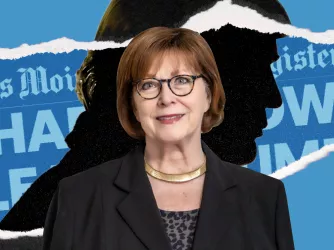Table of Contents
Want to view art at East Tennessee State? You’ll have to sign a waiver first

Joe Gibbs
Joel Gibbs' painting "Evolution" depicting Tennessee state House Speaker Mike Johnson in front of swastikas that morph into a Christian cross.
“I dream of making a difference in some way with my art. I might attempt to right political, social, and religious wrongs by showing the rest of society a glimpse of how I feel about serious issues in the world.”
These are the words of the late Fletcher Dyer, a graphic design student at East Tennessee State University who died in 2009 in a motorcycle crash during his senior year. Since Dyer’s passing, ETSU has hosted the FL3TCH3R Exhibit in his honor. This year’s edition, which includes pieces depicting prominent conservative politicians alongside swastikas, Nazis, anti-Semitic slogans, and the infamous white hoods worn by the Ku Klux Klan, has drawn ire from elected officials and the public. And now, you’ll have to sign a waiver if you want to see the art.
While ETSU President Brian Noland has refused to capitulate to calls for the exhibit’s removal, the university has nonetheless erected barriers restricting access to the artwork, which is scheduled to be on display through Friday. First, attendees will encounter signs warning them of the exhibit’s controversial content. Then, in a move that is unprecedented in FIRE’s experience, attendees will have to sign a waiver before they can access the exhibit.
This waiver requirement reflects the same mindset that led to the rise of trigger warnings in the 2010s — that people must be protected from difficult ideas. And we’ve all seen how limiting that philosophy can be.
FIRE joined the National Coalition Against Censorship in its Dec. 4 statement to Noland, which further explained that this requirement places an real burden on the public’s ability to anonymously enjoy art. In turn, this threatens to turn away potential viewers who may otherwise want to engage with protected works of art. Given the controversy over this exhibit, people who prefer not to alert bureaucrats to their personal activities are not going to put their names down on a list of attendees — and certainly not with lawmakers, ETSU officials, and the public up in arms about the exhibit.
Every great work of art is offensive to someone, for a work of art is a protest against things as they are and proclamation of things as they ought to be.
As the university’s own Free Speech Policy makes clear, “It is not ETSU’s duty to attempt to shield individuals from free speech, including ideas and opinions they find offensive, unwise, immoral, indecent, disagreeable, conservative, liberal, traditional, radical, or wrong-headed.” ETSU community members should neither expect further warnings nor be expected to sign extra legal documents to experience a museum.
If ETSU is to honor its own policy, and its obligations as a public university under the First Amendment, it must allow art displays — especially political expression — that some find offensive. Otherwise, art and political speech generally are under grave threat.
As Gerald W. Johnson, a writer and journalist admired by Dyer, once wrote, “Every great work of art is offensive to someone, for a work of art is a protest against things as they are and proclamation of things as they ought to be.”
FIRE and the NCAC agree. That’s why we’ve urged ETSU to honor the spirit of Fletcher Dyer in the exhibit that bears his name by removing the onerous waiver requirement and letting attendees fully enjoy the exhibit as it was meant to be enjoyed — freely and openly.
Recent Articles
FIRE’s award-winning Newsdesk covers the free speech news you need to stay informed.

FIRE’s defense of pollster J. Ann Selzer against Donald Trump’s lawsuit is First Amendment 101

University of Washington alumni seek to revive the spirit of free inquiry

Meta’s content moderation changes closely align with FIRE recommendations


